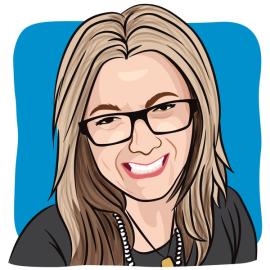- About Us
- Advertise / Support
- Editorial Board
- Contact Us
- CancerNetwork.com
- TargetedOnc.com
- OncLive.com
- OncNursingNews.com
- Terms & Conditions
- Privacy
- Do Not Sell My Information
- Washington My Health My Data
© 2025 MJH Life Sciences™ and CURE - Oncology & Cancer News for Patients & Caregivers. All rights reserved.
How I Navigate the Lynch Syndrome Labyrinth

Georgia Hurst is a fierce patient advocate for those with Lynch syndrome. Her advocacy work has afforded her opportunities to write for medical journals, various websites, books and genetic testing companies, and collaborate as a stakeholder for the National Academy of Sciences: Genomics and Population Health Collaborative. She is the co-creator of #GenCSM (Genetic Cancer Social Media) on Twitter.
Although many hate drinking the prep for colonoscopies, I view it as a privilege.
Living with Lynch syndrome, the most prevalent hereditary cancer syndrome and the primary cause of hereditary colorectal cancer, has been a journey filled with unique challenges and exhausting uncertainty.
Reflecting on the time over a decade ago when I received my diagnosis in Evanston, IL., I vividly recall the overwhelming sense of unpredictability that emerged. In those early days, seeking out specialists familiar with Lynch syndrome in Chicago felt akin to embarking on an arduous quest, with each appointment or consultation similar to finding a needle in a haystack. Frustration became my constant companion as I delved into exhaustive research, determined to uncover the doctors leading the charge in Lynch syndrome research and care at that time.
However, the challenges continued. Coordinating the multitude of doctors' appointments required due to my predisposition to various cancers became an additional source of frustration. Three distinct hurdles emerged: the scarcity of doctors well-versed in Lynch syndrome screening protocols, the significant time investment required for scheduling and attending appointments and the lack of communication between medical professionals and institution portals. This fragmented medical landscape made finding comprehensive care within a single medical institution disconcerting. Genetic testing is supposed to empower you with knowledge so that you can take proactive measures. How can I get proper care and management for something so few doctors know about?
Amidst this labyrinth of challenges, I found hope at Mayo Clinic in Rochester, Minnesota. Eventually, I could see a team that worked for me, schedule most of my care within a three-day window each year, and not fret over whether or not my doctors are all on the same page regarding my medical care.
But there is a downside—I travel alone and stay in a hotel for a couple of days, which is costly and overwhelming, and this can exacerbate some of my anxiety. However, I am most anxious before my scopes. I have found connecting with loved ones via Facetime helpful because it lessens the feelings of anxiety.
Indeed, knowledge is only power when it is actionable.
I gladly drink the colonoscopy prep so many people detest — I view it as an enormous privilege, an advantage that so many who had died from colon cancer before us did not have. Each step of this process served as a poignant reminder of the privilege bestowed upon me—an advantage denied to countless individuals who succumbed to colon cancer without the opportunity for preventive care. The most poignant moment for me is the morning of my scopes, where I cannot help but think of my brother Jimmy, who did not have the opportunity for preventive colonoscopies and care. I'm profoundly grateful for the awareness of my Lynch syndrome diagnosis and the chance to take proactive measures.
Indeed, knowledge is only power when it is actionable.
Navigating Lynch syndrome has been challenging, but proactive medical choices have been my salvation. Finding a supportive care team provided solace amidst pressing uncertainty. Thankfully, as awareness grows for Lynch syndrome, more hospitals establish Lynch syndrome Centers, addressing key issues.
With Colorectal Cancer Awareness Month approaching, I urge those aged 45 and older to prioritize colonoscopies—colonoscopies save lives!
For Amy, my pharos.
Related Content:



